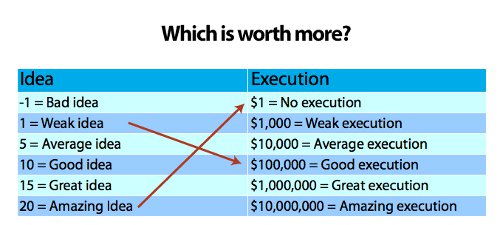 This is a general call to the wider blogging (and reader of blogs) community:
This is a general call to the wider blogging (and reader of blogs) community:
[Hey, that’s you!]
I’m looking for the next $20 idea!
“Wait!”, you say, “Surely you mean that you’re looking for the next $1,000,000 idea?!”.
But, no (I say, barely managing to stifle a yawn), million dollar ideas are dime a dozen …
… why, I have one almost every single day!
[And, I bet you do, too]
No, what I’m really looking for is the next $20 idea …
… submitted by a team with $1,000,000 worth of execution.
Derek Sivers said it best:
It’s so funny when I hear people being so protective of ideas. (People who want me to sign an NDA to tell me the simplest idea.)
To me, ideas are worth nothing unless executed. They are just a multiplier. Execution is worth millions.
That’s why I don’t want to hear people’s ideas.
I’m not interested until I see their execution.
Derek Sivers’ chart shows that even the best idea is only worth $20 (whilst the worst ones – which means most ideas – will actually lose you money).
On the other hand, great teams can make even a mediocre idea fly, and take a great idea from zero to IPO in just a few, short years.
So, this chart’s just an example, to illustrate an idea, right?
No.
According to David S Rose (a third generation serial entrepreneur/investor who has personally invested in over 80 businesses), it’s actually a remarkably accurate tool for assessing the current value of the new Internet and traditional businesses springing up all over the place …
Let’s take a couple of examples:
The Big Internet Idea
Let’s start by looking at almost any of the ‘amazing ideas’ bought by large corporates from their founders in the last few years, e.g: Yahoo has a pretty miserable track record when it comes to startup acquisitions, including Flickr, Delicious, and MyBlogLog and Google has also made a series of startup acquisitions that went nowhere.
Could it be that Google and Yahoo selected badly? Or, is it simply that a corporate cannot execute on these $20 ideas as well as their $1,000,000 founding teams?
The clue is in Google’s failed acquisition of Dodgeball … the founder left and started his next business: the hugely successful Foursquare.
So, in this case, Dennis Crowley (founder of both Dodgeball and Foursquare) came up with the $20 ideas but, in Google’s hands, execution of his first idea was worthless ($1), whilst his own execution of his second idea was clearly worth millions.
The Lifestyle Business
But, what happens if you take a pretty weak idea and give it to a good aspiring-entrepreneur?
Then you have Josh, who started a web-site drop-shipping high end camera gear from China to photographers all over the world, straight out of college.
That was a year ago, and now Josh has a great little business.
The idea may not be very good (after all, anybody can set up an online eCommerce store in about 5 minutes these days, and drop-ship stuff from the USA and China), but he has executed on his ideas when so many others simply don’t put the time and effort in, so they fail before they even begin …
…. so his $1 idea x his $100,000 execution really has given him a great ‘lifestyle’ business … earning him over $100k p.a. in just over a year.
Not bad for somebody so young; not bad for anybody who doesn’t have their eyes set on reaching the stars.
Not so, Ruslan Kogan …
Ruslan, a young Australian, was exactly like Josh, just a few years ago:
Kogan started drop-shipping TV’s and other electronic gear from China to Australia. But, what elevated his idea from an easily replicable $1 idea to a $15 ‘great idea’ was branding everything with his own name: Kogan.
But, what turned his $15 ‘great idea’ into the multi-million dollar business that it is today is amazing execution ($10,000,000): http://www.dreambuildinspirelead.com/3-lessons-from-entrepreneur-ruslan-kogan/
Yes, Ruslan’s business, today, is easily worth $150,000,000 ($15 idea x $10,000,000 execution).
See, this unique valuation tool really does work!
So, don’t be the last person in the world to realize that even the world’s most amazing ideas only $20: it’s million dollar execution that counts … if you want a $20 million business?
But, don’t come to me to fund you until you can prove it 😉



 Thanks to all of those who responded asking for further information on this
Thanks to all of those who responded asking for further information on this 